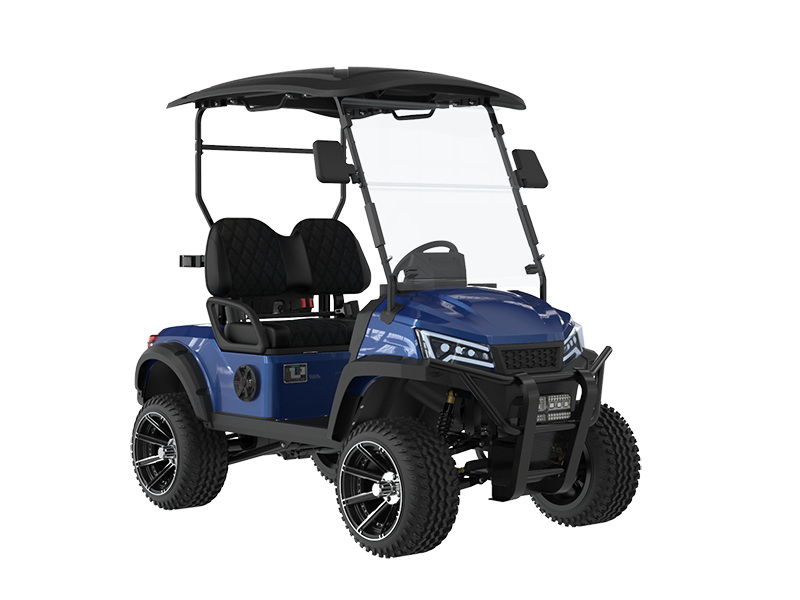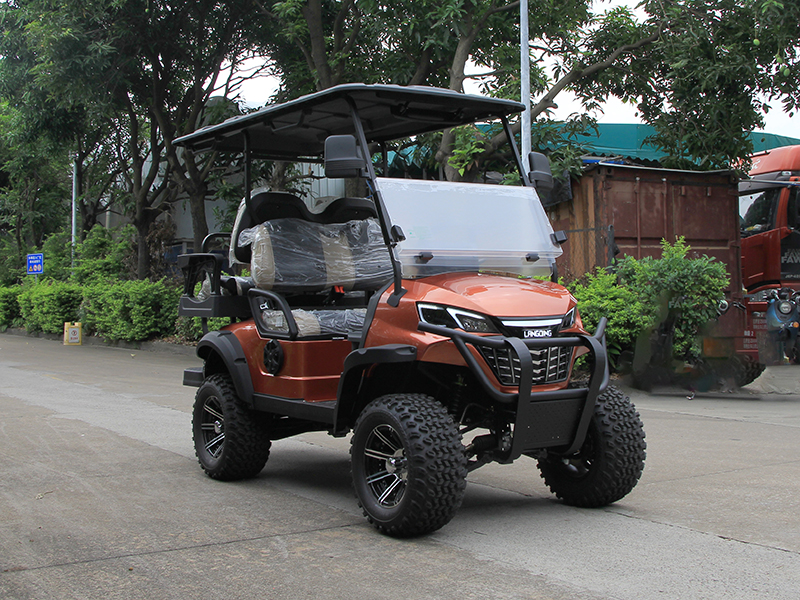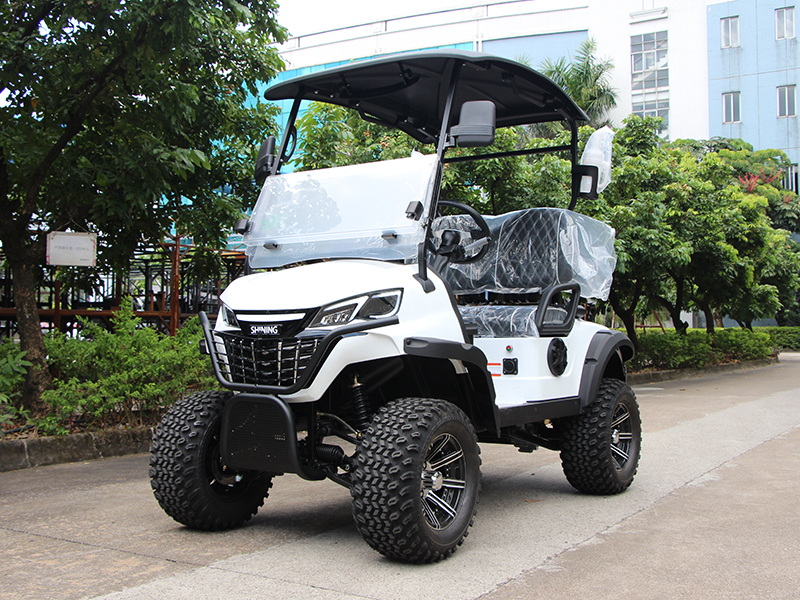Content Menu
● Market Overview of Electric Golf Vehicle Manufacturers and Suppliers in Japan
● Leading Manufacturers in Japan's Electric Golf Vehicle Industry
>> Yamaha Motor Co., Ltd.
>> Textron Inc. (E-Z-GO)
>> Club Car (Ingersoll Rand)
● Regional Market Highlights
>> Tokyo and Kantō Region
>> Osaka and Kansai
>> Aichi and Chubu
>> Hokkaido and Tohoku
● Innovations and Trends in Japanese Electric Golf Vehicle Manufacturing
>> Autonomous Driving and AI Integration
>> Battery Technology Advancements
>> Eco-Friendly and Sustainable Design
>> Multi-Purpose Customization and Versatile Applications
>> Smart Connectivity and Fleet Management
● Challenges Facing Electric Golf Vehicle Manufacturers and Suppliers in Japan
● Conclusion
● FAQ
>> 1. What types of electric golf vehicles are most common in Japan?
>> 2. Which companies dominate the electric golf vehicle market in Japan?
>> 3. How are technological advancements impacting electric golf vehicles in Japan?
>> 4. What factors drive the demand for electric golf carts in Japan?
>> 5. What challenges do electric golf vehicle manufacturers face in Japan?
● Citations:
The electric golf vehicle market in Japan is a vibrant and technologically advanced sector, deeply intertwined with the country's rich golfing culture, innovative technologies, and commitment to sustainability. Japanese manufacturers and suppliers have positioned themselves as leaders in the global electric golf cart industry by blending reliability, eco-friendly designs, and cutting-edge features such as autonomous driving and advanced battery systems. This article provides an in-depth overview of Japan's top electric golf vehicle manufacturers and suppliers, explores market trends, regional highlights, innovation breakthroughs, and future opportunities.

Market Overview of Electric Golf Vehicle Manufacturers and Suppliers in Japan
Japan's electric golf vehicle market was valued at approximately USD 55.2 million in 2025 and is expected to reach USD 79.4 million by 2035, growing at a compounded annual growth rate (CAGR) of 3.7%. The growth is propelled by several key factors:
- The aging population turning to golf for low-impact recreation. As Japan faces a demographic shift, golf remains a popular choice for older adults seeking a low-intensity, social physical activity.
- The strong golfing culture with over 2,000 golf courses nationwide, which sustains consistent demand for golf carts designed for performance and comfort.
- Governmental push towards sustainability and carbon neutrality, which encourages manufacturers to innovate eco-friendly, low-emission electric vehicles.
- The surge in demand for electric mobility solutions across leisure, industrial, healthcare, and tourism sectors.
These factors collectively fuel demand for electric golf carts that emphasize comfort, efficiency, and eco-friendliness. Rental models dominate ownership patterns due to Japan's space constraints, shared mobility trends, and preference for low-maintenance solutions that optimize cost efficiency.
Leading Manufacturers in Japan's Electric Golf Vehicle Industry
Yamaha Motor Co., Ltd.
Yamaha stands as the most prominent player in Japan's market with a 25-30% market share. Renowned for its blend of technological innovation and sustainability, Yamaha is a pioneer of lithium-ion battery technologies and autonomous electric golf carts.
- Flagship Products: Recently launched five-seater models, including the G30Es and G31EPs electric golf carts, offer extended range, enhanced comfort, and smart features designed for 2025 market release.
- Technological Innovations: Yamaha's proprietary lithium iron phosphate (LFP) batteries boast high reliability and extended lifespan, combined with high-performance AC motors that deliver smooth, powerful rides. Their Vehicle Control Units (VCU) optimize motor control and energy efficiency.
- Sustainability Focus: Innovative regenerative braking systems and brushless AC motors reduce power consumption by approximately 30%, contributing to Yamaha's green mobility goals.
- Yamaha's commitment to IoT integration enables smart fleet management and electromagnetic guidance systems that pioneer autonomous golf cart navigation and safety.
Textron Inc. (E-Z-GO)
E-Z-GO holds around 20-25% of the market share globally and has adapted its product offerings to meet Japanese consumer needs, emphasizing comfort, style, and sustainability.
- Product Range: Their offerings include street-legal vehicles suitable for urban and resort environments along with customizable electric golf carts for diverse terrains.
- Technology: Advanced electric powertrains ensure durability, ease of use, and smooth performance under various conditions.
- Sustainability: E-Z-GO's focus on low-emission designs aligns with Japan's environmental policies, promoting eco-friendly and energy-efficient transportation on golf courses.
Club Car (Ingersoll Rand)
Club Car has captured 15-20% of the Japanese market by specializing in luxury, high-quality, and customizable electric golf vehicles.
- Product Focus: The company offers street-legal lifestyle golf carts and high-end variants designed for comfort and style.
- Innovation: Club Car integrates automation technologies and GPS capabilities that enhance navigation and user experience.
- Customization: Their vehicles are tailored not only for golf but also for recreational, social, and light logistics uses, broadening their market appeal.
Regional Market Highlights
Tokyo and Kantō Region
The Tokyo metropolitan area and the broader Kantō region represent Japan's largest and most technologically advanced electric golf vehicle market. Here, luxury clubs, corporate golf lounges, and urban resorts drive demand for sophisticated electric golf carts that feature autonomous driving, integrated smart mobility platforms, and advanced digital fleet management systems. The region's high population density and urban mobility challenges foster innovation in compact, high-tech models that optimize space and enhance user safety.
Osaka and Kansai
The Osaka and Kansai regions utilize electric golf carts across a variety of applications. Beyond golfing, multi-purpose electric vehicles serve eldercare facilities, large events, and urban shuttle services. Cities such as Kyoto and Nara emphasize electric carts with designs that respect traditional aesthetics, catering to heritage tourism and hospital logistics. This blending of old-world charm and modern technology showcases the adaptability of electric golf vehicles.

Aichi and Chubu
Known as an epicenter of Japan's automotive and advanced manufacturing industries, Aichi and the Chubu region are at the forefront of electric vehicle innovation. The electric golf vehicle market here is characterized by experimental technologies such as solar-powered carts, battery-swapping stations, and modular vehicle designs that allow easy configuration for different purposes. The region's industrial expertise supports cutting-edge research in battery efficiency and vehicle durability.
Hokkaido and Tohoku
Japan's northern regions, including Hokkaido and Tohoku, present unique challenges due to harsh winters and rugged terrains. Electric golf carts used here are adapted with weather-resistant cabins, heating options, and all-terrain capabilities to ensure year-round usability. These carts facilitate tourism, agro-tourism, and elder mobility in rural and semi-urban areas, expanding the functional role of electric golf vehicles beyond the fairway.
Innovations and Trends in Japanese Electric Golf Vehicle Manufacturing
Autonomous Driving and AI Integration
Japan is a worldwide leader in integrating autonomous driving technologies into electric golf carts. Semi-autonomous and fully autonomous golf vehicles equipped with GPS navigation, embedded guide-wire systems, and AI-based obstacle detection enhance safety and ease of use. These features enable effective operation on sprawling golf courses, resorts, and even urban campuses, reducing the need for driver input and allowing for fleet-wide management optimization.
Battery Technology Advancements
Battery technology continues to be a core focus, with Japanese manufacturers moving from conventional lead-acid to lithium-ion and solid-state batteries. Yamaha's in-house developed lithium iron phosphate (LFP) batteries offer superior thermal stability, longer lifespan, and sustainable performance, contributing to more reliable electric golf vehicles. Innovations such as fast charging, battery swapping, and solar-assisted charging systems are also emerging, helping to overcome infrastructure constraints.
Eco-Friendly and Sustainable Design
Sustainability remains a foundational principle for Japan's electric golf vehicle producers. Use of recyclable materials, energy-efficient drive systems, and regenerative braking strategies lowers environmental impact. Some models incorporate solar panels to supplement battery charging, reflecting Japan's green energy ambitions. The focus on lightweight chassis design additionally enhances energy economy while maintaining vehicle durability.
Multi-Purpose Customization and Versatile Applications
Beyond traditional golfing, electric golf vehicles in Japan serve healthcare institutions, tourism, event transportation, and logistics sectors. The universal platforms used by manufacturers allow easy retrofitting with specialized equipment like medical storage compartments, passenger seating for eldercare, and cargo modules. This versatility enables OEM suppliers and brand partners to cater to a wide customer base while driving industry growth.
Smart Connectivity and Fleet Management
The infusion of IoT technologies into electric golf vehicles enables real-time monitoring, predictive maintenance, and optimized route management. Fleet operators in golf resorts, healthcare facilities, and industrial parks benefit from software platforms that increase vehicle uptime, track battery health, and manage usage patterns. This connectivity trend improves operational efficiency and total cost of ownership.
Challenges Facing Electric Golf Vehicle Manufacturers and Suppliers in Japan
Despite the promising growth and innovation, the industry faces several challenges:
- Regulatory Restrictions: Japan imposes strict regulations on street legality and public road usage of electric golf vehicles, limiting their operational range and necessitating specialized designs to comply.
- High Production Costs: Customization, advanced technology integration, and superior battery systems raise production expenses and retail prices, which can dampen wider adoption.
- Seasonal and Environmental Constraints: Northern regions with harsh winters require specialized cold-weather adaptations, increasing engineering complexity and costs.
- Storage and Charging Infrastructure: Urban density and real estate prices restrict facility space, complicating fleet storage and charging installations, especially for larger-scale operations.
Nonetheless, continuous government support through subsidies and research funding, combined with industry advances, sustain a positive outlook for long-term expansion.
Conclusion
Japan's electric golf vehicle manufacturing and supply industry exemplifies a blend of tradition and innovation, driven by the country's robust golfing culture and deep commitment to sustainability. Market leaders like Yamaha, Textron (E-Z-GO), and Club Car leverage state-of-the-art battery technology, autonomous driving features, and eco-friendly designs to capture a significant share of the market while addressing varied customer needs. Regional market variations showcase adaptability to urban density, tourism, and climate challenges, while ongoing technological advancements ensure electric golf vehicles continue to evolve beyond traditional roles into multifunctional transportation solutions. Despite regulatory and environmental hurdles, Japan's manufacturers and suppliers are well-positioned to maintain leadership in the global electric golf vehicle industry, targeting steady growth and expanded applications through 2035 and beyond.

FAQ
1. What types of electric golf vehicles are most common in Japan?
Electric golf vehicles in Japan range from manual and semi-autonomous models to fully autonomous carts. Battery technologies primarily include lithium-ion (notably lithium iron phosphate) models, and many vehicles serve multi-purpose roles like eldercare and tourism beyond traditional golfing use.
2. Which companies dominate the electric golf vehicle market in Japan?
Yamaha Motor Co., Ltd., Textron Inc. (under the E-Z-GO brand), and Club Car (Ingersoll Rand) are the leading manufacturers, collectively holding approximately 60-75% of the domestic market share.
3. How are technological advancements impacting electric golf vehicles in Japan?
Japanese manufacturers integrate AI for obstacle detection, GPS for navigation, IoT for fleet management, and advanced battery systems for extended range and durability, making electric golf vehicles safer, smarter, and more sustainable.
4. What factors drive the demand for electric golf carts in Japan?
An aging population interested in golf, Japan's substantial golfing culture, environmental regulations, and expanded applications in tourism, healthcare, and logistics are key demand drivers for electric golf vehicles.
5. What challenges do electric golf vehicle manufacturers face in Japan?
Manufacturers navigate strict vehicle regulations, high costs, seasonal and climatic demands, and limited infrastructure for storage and charging, factors that require continuous innovation and strategic planning.
Citations:
[1] https://www.futuremarketinsights.com/reports/japan-electric-golf-cart-market
[2] https://ts-export.com/page.php?page=about_golf_carts
[3] https://www.imarcgroup.com/japan-golf-cart-market
[4] https://powersportsbusiness.com/news/yamaha/2025/03/11/yamaha-reveals-new-five-seater-lfp-golf-carts-in-japan/
[5] https://global.yamaha-motor.com/business/golfcar/
[6] https://www.linkedin.com/pulse/japan-multiple-seat-golf-cart-market-2026-size-key-trends-ai-vjmoc/
[7] https://global.yamaha-motor.com/news/2025/0305/gc.html
[8] https://www.autolink.co.jp/type/golf+cart
[9] https://mobilityforesights.com/product/japan-golf-cart-market
[10] https://www.skyworktech.com/blog/best-5-golf-cart-48v-manufacturer-in-japan
[11] https://kanto-kasei-kogyo.com/lp/en/
[12] https://www.linkedin.com/pulse/electric-golf-cart-market-projections-2025-from-legacy-vdwke/
[13] https://ensun.io/search/golf-cart/japan
[14] https://www.alibaba.com/showroom/golf-cart-japan.html
[15] https://www.marketresearchfuture.com/reports/japan-golf-cart-market-47032
[16] https://global.yamaha-motor.com/about/business/golf-cars/
[17] http://www.usedjapanesetractors.jp/stock-category.php?SubCat=9
[18] https://www.gminsights.com/industry-analysis/electric-golf-cart-market
[19] https://ecoplaneta.com/golf-cart-brands-and-manufactures/
[20] https://www.giiresearch.com/report/imarc1746927-japan-golf-cart-market-report-by-product-type.html










































